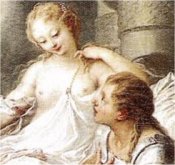
05 Feb 2006
ROSSINI: Armida (Callas)
Armida, Dramma per musica in tre atti.
Music composed by Gioacchino Rossini. Libretto by Giovanni Federico Schmidt based on Gerusalemme liberata by Torquato Tasso.
Andromaca: Dramma per musica in three acts.
Ermione: Azione tragica in two acts.
Ippolito ed Aricia: Tragedia in five acts.
Idomeneo: Opera seria in three acts.
Paride ed Elena: Dramma per musica in five acts.
Orphée: Opera in four acts.
Music composed by Christoph Willibald Gluck (arranged by Hector Berlioz, 1859). Libretto by Ranieri de' Calzabigi
Alceste, ou Le triomphe d’Alcide: Tragédie en musique in a prologue and five acts.
Alceste: Tragédie opéra in three acts.
Medea: Melodramma tragico in three acts.
Oedipe à Colone: Tragédie lyrique in three acts.
Elektra: Tragedy in one act.
Fedra: Dramma per musica in two acts.
Les Troyens: Grand opéra in five acts.
Die Meistersinger von Nürnberg: Music drama in three acts.
Ariadne auf Naxos, Oper with a prologue and one act. Music composed by Richard Strauss. Libretto by Hugo von Hofmannsthal.
Der Schauspieldirektor [The Impresario], Singspiel in one act, K486.
Divertimento teatrale in one act.
Andrea Chénier, an opera in four acts.
La figlia del reggimento [La Fille du régiment (‘The Daughter of the Regiment’)], Opéra comique in two acts.
L’elisir d’amore, Melodramma giocoso in two acts.

Armida, Dramma per musica in tre atti.
Music composed by Gioacchino Rossini. Libretto by Giovanni Federico Schmidt based on Gerusalemme liberata by Torquato Tasso.
Streaming Audio
First Performance: 11 November 1817 at Teatro San Carlos, Naples.
Principal Characters:
| Goffredo | Tenor |
| Rindaldo | Tenor |
| Idraote | Bass |
| Armida | Soprano |
| Gernando | Tenor |
| Eustazio | Tenor |
| Ubaldo | Tenor |
| Carlo | Tenor |
| Astarotte | Bass |
Time and Place: Near Jerusalem during the First Crusade, c. 1099.
Synopsis:
Act I
A battlefield not far from Jerusalem.
The supreme commanding officer Goffredo, together with Eustazio and the paladins are about to elect a successor for the deceased Dudone, when a noblewoman enters—Armida. She is crying and has a large retinue, including Idraote, disguised as a dignitary. She has come to ask for the help of ten soldiers to save her from Idraote who has usurped the throne of Damascus and has threatened to kill her. Obviously, this is a ruse; the enchantress wants to remove the strongest soldiers from the battlefield, above all Rinaldo, who had slipped through her hands once before. After much hesitation, Goffredo gives in to Armida's request and promises her ten soldiers. First, however, he elects Dudone's successor who shall then choose the ten. Once Goffredo has left, Eustazio and the paladins elect Rinaldo much to the chagrin of Gernando, who hoped to be chosen in his place. Thereupon, Armida and Rinaldo meet. The enchantress is able to awaken his love for her. Seeing them together, Gernando insults Rinaldo who then kills his adversary in a brief duel. Rinaldo flees to escape Goffredo's wrath who wants to punish him. He follows Armida. Thus, the enchantress has obtained exactly what she wanted.
Act II
A frightening forest.
Astarotte and the demons come out of the kingdom of inferno and offer Armida their services. The enchantress appears with Rinaldo. The soldier is fascinated by the wonders worked by Armida. With a simple nod, she transforms the forest into the interior of a magnificent palace where nymphs, dwarfs and cupids are dancing, weaving symbolic figurations, including that of a young soldier being seduced by the nymphs and entrapped in the arms of love. It is Rinaldo sitting next to Armida while the dancing continues.
Act III
A forest.
The paladins reach Ubaldo and Carlo—a celestial mission has been sent to save Rinaldo. Using a gold bar, they make the nymphs flee as they try to get closer to them. Hidden in a thicket they hear the words of love exchanged between Armida and Rinaldo. But, when the enchantress leaves, they come out into the open; using Rinaldo's reflection in their adamantine shield, they show him how disgraceful and deplorable it is for him to be enslaved by Armida. Rinaldo is ashamed of himself and decides to return to the battlefield. Goffredo has promised to forgive him. A beautiful beach. The enchantress reaches the three soldiers who are leaving and tries to hold Rinaldo back in every possible way. But now, Rinaldo's sense of honor and pride are stronger that any magical power. Rinaldo follows his comrades leaving Armida unconscious. When she comes round, she fights with herself and cries; but revenge is stronger. Armida mounts her carriage drawn by dragons and, in the midst of smoke and flames, chooses vengeance.
Click here for the complete libretto.
Click here for the complete text of Gerusalemme liberata.
Click here for an English language summary of Gerusalemme liberata.
Click here for Rinaldo and Armida by Anthony van Dyck, 1628-1629